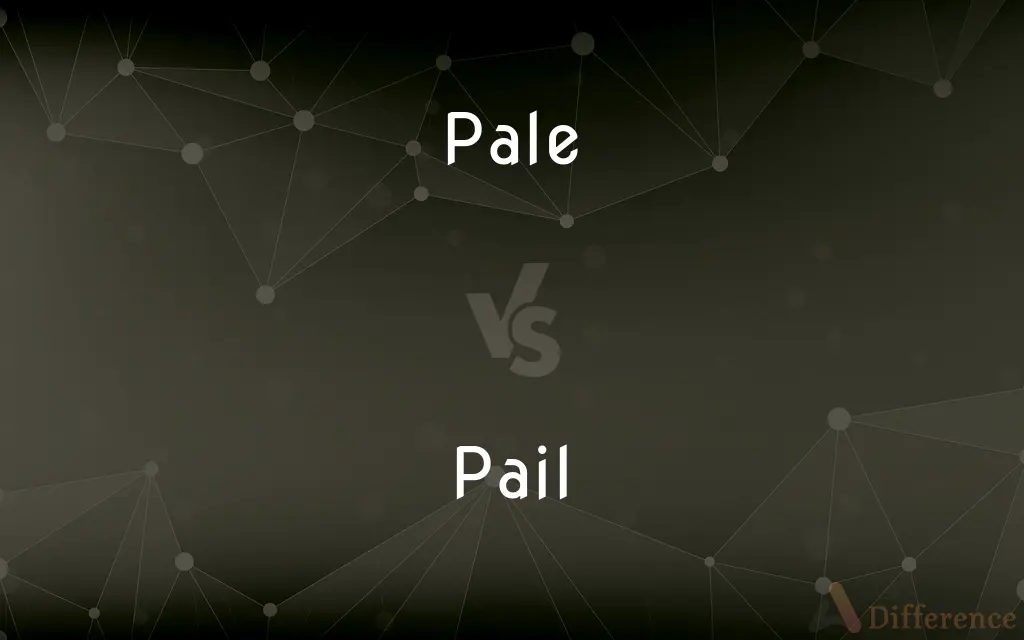Pale vs. Pail — What's the Difference?
Edited by Tayyaba Rehman — By Fiza Rafique — Updated on September 30, 2023
"Pale" refers to a light shade or color, or lacking intensity. "Pail" is a bucket-like container. They are homophones but differ in meaning and use.

Difference Between Pale and Pail
Table of Contents
ADVERTISEMENT
Key Differences
"Pale" and "Pail" are classic examples of homophones in English, words that sound alike but have different meanings. "Pale" typically denotes a lack of intensity in color or complexion. On the other hand, "pail" is a tangible object, referring to a cylindrical container, much like a bucket.
When someone mentions a "pale complexion," they're referring to skin that lacks color, perhaps due to illness or fear. Conversely, if someone talks about fetching water in a "pail," they're discussing using a specific kind of container to carry the liquid.
The word "pale" extends beyond just describing color. It can indicate anything lacking vibrancy or intensity. For instance, a "pale imitation" suggests a replica that doesn't quite capture the essence of the original. In contrast, "pail" remains quite specific in its definition, not often straying from its bucket-like connotation.
Comparison Chart
General Usage
Refers to light shade or lacking intensity
A bucket-like container
Part of Speech
Adjective (often)
Noun
ADVERTISEMENT
Extended Meanings
Can mean lacking vibrancy or a boundary
Mostly fixed to its container sense
Pronunciation
/peɪl/
/peɪl/
Etymology
From Old French "pale" (light-colored)
From Old French "paelle" (pan, dish)
Compare with Definitions
Pale
Lacking intensity in color.
Her face turned pale with fright.
Pail
A receptacle for carrying items.
She filled the pail with fresh fruit.
Pale
Light in colour or shade; containing little colour or pigment
Choose pale floral patterns for walls
Pail
A quantity that fills a pail.
He drank a pail of milk.
Pale
Inferior or unimpressive
The new cheese is a pale imitation of continental cheeses
Pail
A cylindrical container with a handle.
She carried a pail of water from the well.
Pale
Become pale in one's face from shock or fear
I paled at the thought of what she might say
Pail
A vessel of similar shape.
The pail was made of durable plastic.
Pale
Seem or become less important
All else pales by comparison
Pail
A watertight cylindrical vessel, open at the top and fitted with a handle; a bucket.
Pale
A wooden stake or post used with others to form a fence.
Pail
The amount that a pail can hold.
Pale
An area within determined bounds, or subject to a particular jurisdiction.
Pail
A vessel of wood, tin, plastic, etc., usually cylindrical and having a handle -- used especially for carrying liquids, for example water or milk; a bucket (sometimes with a cover).
The milkmaid carried a pail of milk in each hand.
Pale
A broad vertical stripe down the middle of a shield.
Pail
(In technical use) A closed (covered) cylindrical shipping container.
Pale
A stake or pointed stick; a picket.
Pail
A vessel of wood or tin, etc., usually cylindrical and having a bail, - used esp. for carrying liquids, as water or milk, etc.; a bucket. It may, or may not, have a cover.
Pale
A fence enclosing an area.
Pail
A roughly cylindrical that is vessel open at the top
Pale
The area enclosed by a fence or boundary.
Pail
The quantity contained in a pail
Pale
A region or district lying within an imposed boundary or constituting a separate jurisdiction.
Pail
A bucket-like container.
He dropped the coin in the pail.
Pale
Pale The medieval dominions of the English in Ireland. Used with the.
Pale
(Heraldry) A wide vertical band in the center of an escutcheon.
Pale
To enclose with pales; fence in.
Pale
To cause to turn pale.
Pale
To become pale; blanch
Paled with fright.
Pale
To decrease in relative importance.
Pale
Whitish in complexion; pallid.
Pale
Of a low intensity of color; light.
Pale
Having high lightness and low saturation.
Pale
Of a low intensity of light; dim or faint
"a late afternoon sun coming through the el tracks and falling in pale oblongs on the cracked, empty sidewalks" (Jimmy Breslin).
Pale
Feeble; weak
A pale rendition of the aria.
Pale
Light in color.
I have pale yellow wallpaper.
She had pale skin because she didn't get much sunlight.
Pale
(of human skin) Having a pallor (a light color, especially due to sickness, shock, fright etc.).
His face turned pale after hearing about his mother's death.
Pale
Feeble, faint.
He is but a pale shadow of his former self.
The son's clumsy paintings are a pale imitation of his father's.
Pale
(intransitive) To turn pale; to lose colour.
Pale
(intransitive) To become insignificant.
Pale
(transitive) To make pale; to diminish the brightness of.
Pale
To enclose with pales, or as if with pales; to encircle or encompass; to fence off.
Pale
(obsolete) Paleness; pallor.
Pale
A wooden stake; a picket.
Pale
(archaic) Fence made from wooden stake; palisade.
Pale
(by extension) Limits, bounds (especially before of).
Pale
The bounds of morality, good behaviour or judgment in civilized company, in the phrase beyond the pale.
Pale
(heraldry) A vertical band down the middle of a shield.
Pale
(archaic) A territory or defensive area within a specific boundary or under a given jurisdiction.
Pale
(historical) The parts of Ireland under English jurisdiction.
Pale
(historical) The territory around Calais under English control (from the 14th to 16th centuries).
Pale
(historical) A portion of Russia in which Jews were permitted to live.
Pale
(archaic) The jurisdiction (territorial or otherwise) of an authority.
Pale
A cheese scoop.
Pale
Wanting in color; not ruddy; dusky white; pallid; wan; as, a pale face; a pale red; a pale blue.
Speechless he stood and pale.
They are not of complexion red or pale.
Pale
Not bright or brilliant; of a faint luster or hue; dim; as, the pale light of the moon.
The night, methinks, is but the daylight sick;It looks a little paler.
Pale
Paleness; pallor.
Pale
A pointed stake or slat, either driven into the ground, or fastened to a rail at the top and bottom, for fencing or inclosing; a picket.
Deer creep through when a pale tumbles down.
Pale
That which incloses or fences in; a boundary; a limit; a fence; a palisade.
Pale
A space or field having bounds or limits; a limited region or place; an inclosure; - often used figuratively.
Pale
A region within specified bounds, whether or not enclosed or demarcated.
Pale
A stripe or band, as on a garment.
Pale
One of the greater ordinaries, being a broad perpendicular stripe in an escutcheon, equally distant from the two edges, and occupying one third of it.
Pale
A cheese scoop.
Pale
A shore for bracing a timber before it is fastened.
Pale
To turn pale; to lose color or luster.
Apt to pale at a trodden worm.
Pale
To make pale; to diminish the brightness of.
The glowworm shows the matin to be near,And 'gins to pale his uneffectual fire.
Pale
To inclose with pales, or as with pales; to encircle; to encompass; to fence off.
[Your isle, which stands] ribbed and paled inWith rocks unscalable and roaring waters.
Pale
A wooden strip forming part of a fence
Pale
Turn pale, as if in fear
Pale
Very light colored; highly diluted with white;
Pale seagreen
Pale blue eyes
Pale
(of light) lacking in intensity or brightness; dim or feeble;
The pale light of a half moon
A pale sun
The late afternoon light coming through the el tracks fell in pale oblongs on the street
A pallid sky
The pale (or wan) stars
The wan light of dawn
Pale
Lacking in vitality or interest or effectiveness;
A pale rendition of the aria
Pale prose with the faint sweetness of lavender
A pallid performance
Pale
Abnormally deficient in color as suggesting physical or emotional distress;
The pallid face of the invalid
Her wan face suddenly flushed
Pale
Not full or rich;
High, pale, pure and lovely song
Pale
Feeble or weak.
The light was too pale to read by.
Pale
Not vigorous or hearty.
A pale rendition of the original song.
Pale
A boundary or limit.
He went beyond the pale of acceptable behavior.
Pale
Light in color or shade.
She chose a pale blue dress.
Common Curiosities
Are "Pale" and "Pail" spelled the same?
No, "Pale" relates to color while "Pail" is a container.
Can "Pale" describe someone's health?
Yes, a "pale complexion" can suggest illness or fear.
Can "Pale" describe light?
Yes, "pale light" means light that is weak or dim.
Is "Pail" synonymous with "bucket"?
Yes, a "pail" is essentially a type of bucket.
What's the primary use of a "Pail"?
It's typically used to hold or carry liquids.
Does "Pale" always relate to color?
Most often, but it can also indicate boundaries or lacking intensity.
Can I say, "He brought a pail of sand"?
Yes, a "pail" can hold various materials, not just liquids.
Share Your Discovery

Previous Comparison
Chaos vs. Confusion
Next Comparison
Monies vs. MoneysAuthor Spotlight
Written by
Fiza RafiqueFiza Rafique is a skilled content writer at AskDifference.com, where she meticulously refines and enhances written pieces. Drawing from her vast editorial expertise, Fiza ensures clarity, accuracy, and precision in every article. Passionate about language, she continually seeks to elevate the quality of content for readers worldwide.
Edited by
Tayyaba RehmanTayyaba Rehman is a distinguished writer, currently serving as a primary contributor to askdifference.com. As a researcher in semantics and etymology, Tayyaba's passion for the complexity of languages and their distinctions has found a perfect home on the platform. Tayyaba delves into the intricacies of language, distinguishing between commonly confused words and phrases, thereby providing clarity for readers worldwide.













































